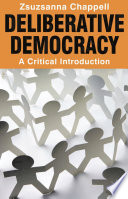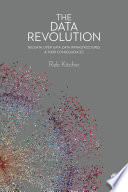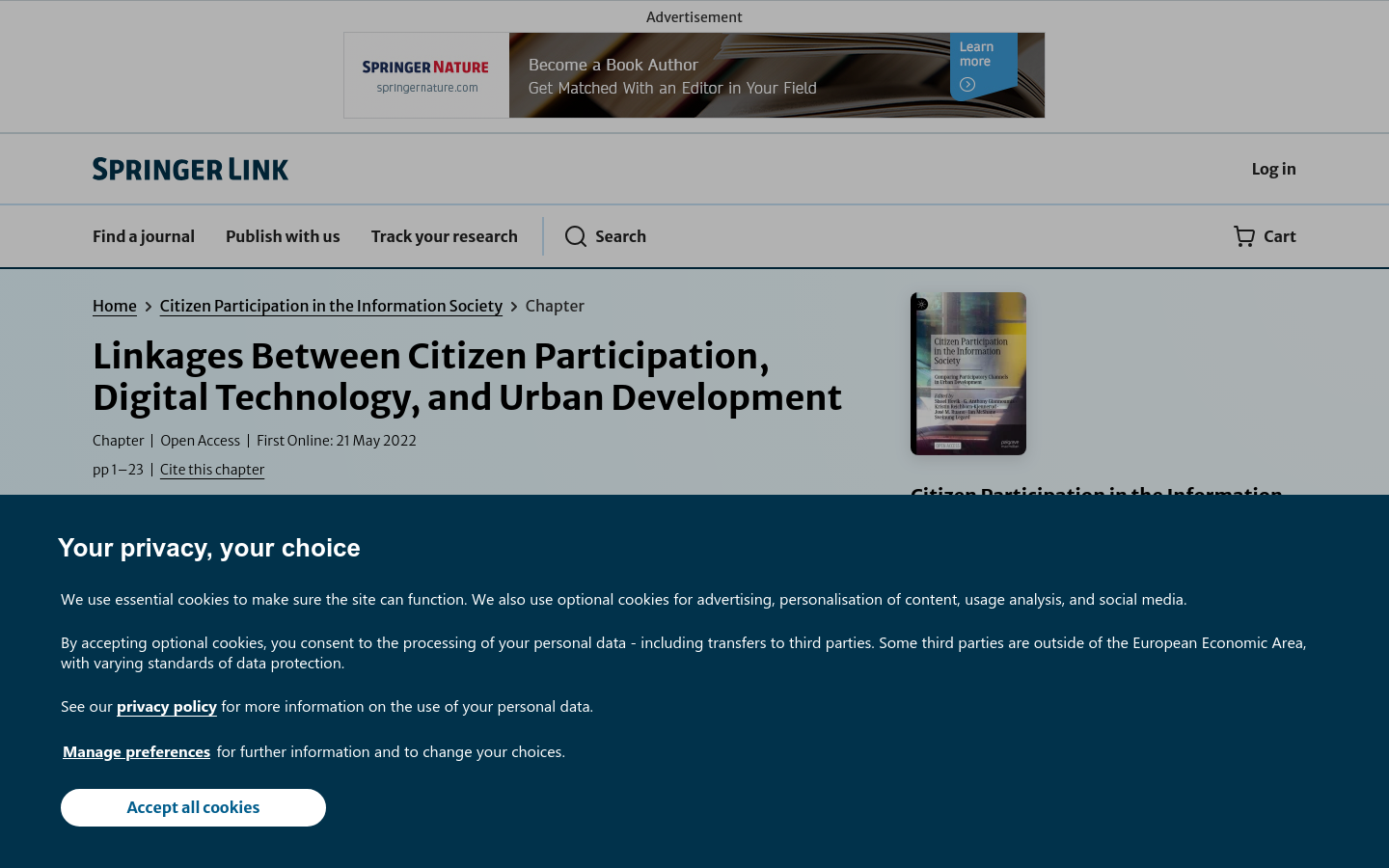Civic Tech Field Guide
Sharing knowledge and productively growing the fieldSearch Results - engage (1639)
Showing 1639 Results

This book provides an ideal starting point in understanding the core concepts of deliberative democracy

Why are some civic associations better than others at getting - and keeping - people involved in activism? From MoveOn.org to the National Rifle Association, Health Care for America Now to the Sierra Club, membership-based civic associations constantly seek to engage people in civic and political action. What makes some more effective than others? Using in-person observations, surveys, and field experiments, this book compares organizations with strong records of engaging people in health and environmental politics to those with weaker records. To build power, civic associations need quality and quantity (or depth and breadth) of activism. They need lots of people to take action and also a cadre of leaders to develop and execute that activity. Yet, models for how to develop activists and leaders are not necessarily transparent. This book provides these models to help associations build the power they want and support a healthy democracy. In particular, the book examines organizing, mobilizing, and lone wolf models of engagement and shows how highly active associations blend mobilizing and organizing to transform their members' motivations and capacities for involvement. This is not a simple story about the power of offline versus online organizing. Instead, it is a story about how associations can blend both online and offline strategies to build their activist base. In this compelling book, Hahrie Han explains how civic associations can invest in their members and build the capacity they need to inspire action.

In Sharing Cities, Duncan McLaren and Julian Agyeman argue that the intersection of cities' highly networked physical space with new digital technologies and new mediated forms of sharing offers cities the opportunity to connect smart

The book offers a valuable interdisciplinary dialogue on the challenges and opportunities of the increasingly influential space of civic media

Just what is the “participatory condition”? It is the situation in which taking part in something with others has become both environmental and normative

This Handbook concentrates on democracy beyond the traditional governmental structures to explore the full scope of participatory governance.

The book significantly enhances current scholarship, serving as a guide to existing research and identifying useful future research

For those looking to organize for the first time or for seasoned activists looking to update their repertoire, the time is ripe for a playbook like Becoming a Citizen Activist.

"This volume strengthens the dialogue between conceptual perspectives, approaches, and fields on deliberative and participatory forms of democratic innovation and offers novel insights, focusing on the Southeast European space."

In the process, this book argues that scholars need to understand how technological development around politics happens in time and how the dynamics on display during presidential cycles are the outcome of longer processes

This is the latest volume in the distinguished Philosophy, Politics and Society series, known for engaging debates that cut across political science, philosophy, the law, and other disciplines

This book covers: creating meaningful innovations that improve quality of life, engage users and provide value for organizations and other stakeholders, guiding the creation of shared value throughout the innovation process, with a ...

In this timely book, Paul Mihailidis explores the texture of daily engagement in civic life, and the resources—human, technological, and practical—that citizens employ when engaging in civic actions for positive social impact.

Drawing on diverse theoretical perspectives, this book examines questions of youth citizenship and participation by exploring their meanings in policy, practice and youth experience. It examines young people's participation in non-government and youth-led organisations, and asks what can be done to bridge the democratic disconnect.

The Oxford Handbook of Deliberative Democracy takes stock of deliberative democracy as a research field, in philosophy, in various research programmes in the social sciences and law, and in political practice around the globe

Ideal for art and media educators within preservice and higher education spaces, this book equips readers to prepare their students to be thoughtful and critical producers of their own media that can effectively advocate for social change.

MASS LBP
TorontoWe have led more than 50 Reference Panels and Citizens’ Assemblies contributing approximately 71,000 volunteer hours to policy-making in Canada — making MASS internationally recognized for its work in public deliberation.

This paper studies how the Global Open Data Index (GODI) mobilises different audiences and translates into open data policy and publication.

Governments can use artificial intelligence (AI) to design better policies and make better and more targeted decisions, enhance communication and engagement with citizens, and improve the speed and quality of public services

Accessible in style, the book provides: A synoptic overview of big data, open data and data infrastructures An introduction to thinking conceptually about data, data infrastructures, data analytics and data markets Acritical discussion of ...

This second edition examines new strategies, tactics, issues, and grassroots campaigns, and revisits whether activists have learned from past mistakes.

This book discusses the implications of recent innovations in information and communication technology for civic and political engagement.

Participatory Budgeting (PB) exists at varying scales in more than 3,000 cities across the globe and the process continues to expand both in scale and in new technology, particularly as digital technologies are being integrated into a ...

Learning Through Citizen Science: Enhancing Opportunities by Design discusses the potential of citizen science to support science learning and identifies promising practices and programs that exemplify the promising practices.

Two specific challenges are at the core of this book's argument that media literacy is the path toward more active and robust civic engagement in the 21st century: How can media literacy enable core competencies for value-driven, diverse ...

Is this true? In Uneven Innovation, Jennifer Clark considers the potential of these emerging technologies as well as their capacity to exacerbate existing inequalities and even produce new ones

Highlighting a wide range of topics including community inclusion, cultural innovation, and public safety, this book is ideally designed for urban planners, entrepreneurs, engineers, government officials, policymakers, academicians, ...

In democratic societies there is widespread acknowledgment of the need to incorporate citizens’ input in decision-making processes in more or less structured ways.

Informed by a comparative case study approach, this book seeks to narrow that gap and offer practical policy solutions to facilitate local e-government.

Yet, the growing role of social media in everyday life has raised challenging questions about privacy, advertising, and the effect on young people that are addressed in this book.

This book offers conceptual frameworks, theoretical insights, and practical lessons for dealing with the problem

Analyzing the Role of Citizen Science in Modern Research focuses on analyzing data on current initiatives and best practices in citizen engagement and education programs across various disciplines.

This book is an invaluable resource for readers in the established fields and professions of design, architecture, urban design, and city planning as well as the emerging fields of urban technology and urban interaction design.

This book assesses the interplay between social media, political polarization, and civic engagement, focusing on countries with differing media environments, cultural specifics, and degrees of democratization

Global in scope, books in the series are characterised by a stress on comparative analysis and strong methodological rigour

This clear-eyed guide steps back from hyperbolic hopes and fears to offer a balanced account of what aspects of politics are being shaped by digital media and what remains unchanged

Located at the nexus between politics and the digital, this PhD thesis wants to shed light on the changing dynamics, opportunities and challenges citizens and parties are confronted with due to ongoing technological changes

The editors of this book have a straightforward goal: to inspire you to engage your students through public collaboration in scientific research--also known as citizen science.

The timely book takes stock of the state of the art and future of electronic democracy, exploring the history and potential of e-democracy in global perspective.

MosaicLab
Melbourne VIC, Australiawe’re a highly experienced team of facilitators and community engagement practitioners specialising in high influence and deliberative engagement

Bringing together perspectives from around the world, this volume examines emerging forms of citizen participation in the face of the evolving logics of political communication, and provides a unique and original focus on the gap which ...

Starting from the 1980s, this book provides the first, complete history of the idea of deliberative democracy, analysing its relationship with the earlier idea, and practices, of participatory democracy in the 1960s and 1970s.

This book is about the principles behind the open government data movement and its development in the United States.









